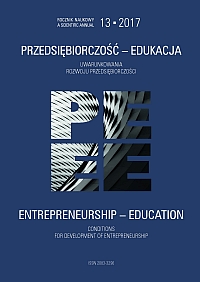Tutoring as an Alternative Method of Education
DOI:
https://doi.org/10.24917/20833296.13.21Keywords:
Master – disciple relationship, education system, method, tutoringAbstract
The paper focuses on attempts of implementing tutoring in the Polish education system. Tutoring as a new form of work with the student, based mainly on a symmetrical relationship between the teacher and the student, has a short record of existence in the Polish education system at the level of secondary education. Tutoring is generally seen as the idea of an alternative to traditional methods of working with students, becoming an opportunity for mutual understanding of intellectual and emotional needs of the student and the teacher. Tutoring is also a method that differs significantly from the one which is used successfully in English universities. The period of implementation of tutoring and adapting it to the specific context in Polish schools, resulted in the elaboration of the new forms, taking into account the conditions of indigenous cultural and moral factors. This innovative form of work dating back to the roots of classical model of Master-disciple relationship often faces significant barriers, especially in the nature of the system. The aim of the article is not only to identify the roots of this interesting and effective teaching methods, but present the possibilities of its implementation in the Polish education system. The author not only shows the advantages, but also highlights its shortcomings, noting the cultural and system differences between the Anglo-Saxon countries (where tutoring comes from) and a Polish model of education. In addition, the author presents the problem of the specificity of the Polish experience in the implementation of this method, its progress, innovation and positive effects of work.References
Brzezińska, A.I., Rycielska, L. (2009). Tutoring jako czynnik rozwoju ucznia i nauczyciela. W: P. Czekierda, M. Budzyński, J. Traczyński, Z. Zalewski, A. Zembrzuska (red.). Tutoring w szkole. Między teorią a praktyką zmiany edukacyjnej. Wrocław: Wydawnictwo Towarzystwa Edukacji Otwartej, 19–30.
Brzozowski, T.T. (2016). Dialog jako punkt wyjścia dla edukacji współzależnej. W: A. Sarnat-Ciastko (red.). Licea ALA. Szkoły skoncentrowane na uczniu. Nowa kultura szkoły. Wrocław: Wydawnictwo Naukowe Dolnośląskiej Szkoły Wyższej, 87–100.
Fijałkowski, A. (2009). Z dziejów myślenia o tutoringu – krótki zarys historii indywidualnego kształcenia wychowania. Kwartalnik Pedagogiczny, 2(212).
Filek, J. (2010). Życie, etyka, inni. Scherza i eseje filozoficzno-etyczne. Kraków: Wydawnictwo Homini. Frankl, V.E. (2015). Człowiek w poszukiwaniu sensu. Przeł. A. Wolnicka. Warszawa: Wydawnictwo Czarna Owca.
Hryniewicz, W. (2016). Wiara w oczekiwaniu. Rozmawia Justyna Siemienowicz. Kraków: Wydawnictwo ZNAK.
http://cw.edu.pl/ (23.03.2017).
https://en.oxforddictionaries.com/definition/moral_tutor (19.10.2016).
http://kobieta.onet.pl/w-polsce-rozpada-sie-juz-co-trzecie-malzenstwo-jakie-sa-przyczyny-gdzie-jest/0sqyb8 (21.10.2016).
http://kobieta.onet.pl/sa-mlodzi-nie-ucza-sie-i-nie-pracuja-zyja-na-koszt-rodzicow-to-pokolenie-konsumpcyjne/k81g4b (21.10.2016).
http://teo.org.pl/ (23.03.2017).
http://tutoring.org.pl/ (21.03.2017).
http://tutoring.pl/tutoring/ (18.10.2016)
http://tutoring.pl/ (20.03.2017).
http://wiadomosci.onet.pl/kraj/dziennik-gazeta-prawna-wiecej-slubow-wiecej-dzieci-ale-polakow-mniej/r0estv (16.10.2016).
Makowski, M. (2016). Determinanty przedsiębiorczości w opinii nauczycieli i przedsiębiorców. Konkluzje i praktyczne wskazania z programu Perspective. Przedsiębiorczość – Edukacja, 12, 378–390.
Nerwińska, E. (2009). Tutoring szansą dla ucznia, nauczyciela i systemu edukacji. W: P. Czekierda, M. Budzyński, J. Traczyński, Z. Zalewski, A. Zembrzuska (red.). Tutoring w szkole. Między teorią a praktyką zmiany edukacyjnej. Wrocław: Wydawnictwo Towarzystwa Edukacji Otwartej, 10–13.
Pełczyński, Z. (2007). Tutoring wart zachodu. Z doświadczeń tutora oksfordzkiego. W: B. Kaczarowska (red.). Tutoring w poszukiwaniu metody kształcenia liderów. Warszawa, 31–36.
Salcher, A. (2009). Utalentowany uczeń i jego wrogowie. Przeł. A. Rylska-Juruś, Rzeszów: Wydawnictwo Oświatowe FOSZE.
Sarnat-Ciastko, A. (2015). Tutoring w szkole. Warszawa: Wydawnictwo Difin.
Serafin-Juszczak, B. (2014). NEET – nowa kategoria młodzieży zagrożonej wykluczeniem społecznym. Folia Sociologica, 49.
Sitko, M. (2011). Tutoring szansą dla systemu edukacji. Problemy Opiekuńczo-Wychowawcze, 4.
Stoltzfus, T. (2013). Sztuka zadawania pytań w Coachingu. Przeł. B. Olechnowicz, Wrocław: Wydawnictwo Aetos Media.
Wittenberg, A. (2014). Gamifikacja nauczania, tutoring zamiast wykładu. Dziennik Gazeta Prawna, 232(3837).
Downloads
Published
How to Cite
Issue
Section
License
Articles are published under the terms of the Creative Commons License (CC BY-ND 4.0; Attribution– NoDerivs).

